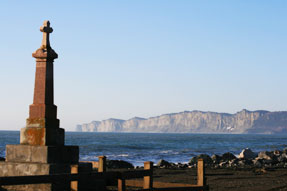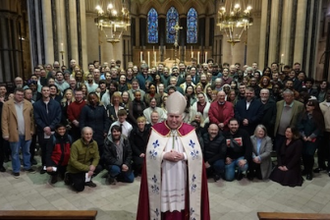Canada: Irish victims of 1847 shipwreck laid to rest

Irish Memorial, Cap-des-Rosiers Beach, Forillon National Park, image Parks Canada
Source: IT/Parks Canada/CBC/BBC
The remains of 21 people, who died 172 years ago in a shipwreck off the coast of Canada when the Carricks 'coffin ship' sank in a storm, were finally laid to rest in a service last Thursday, at the Irish Memorial on Cap-des-Rosiers Beach in Forillon National Park.
The bones of mostly women and children were found on a beach at Cap-des-Rosiers, 700 kilometres northeast of Quebec City, between 2011 and 2016. Experts confirmed that they came from the Carricks, which left County Sligo with 180 emigrants at the height of the famine in 1847.
Forty-eight people survived the shipwreck. 87 bodies have been found of the estimated 120 to 150 dead. Archaeologists said the remains showed that the people were suffering from diseases associated with malnutrition.
Mgr Gérard Sainte-Croix, a great-grandson of Patrick Kavanagh, one of the survivors of the shipwreck led prayers during the ceremony which was organized by the St-Alban Parish Council in Cap-des-Rosiers in collaboration with Parks Canada. Musicians played a lament during the service. Around 150 people attended, among them descendants of the survivors, Laura Finlay from the Irish Embassy and local dignitaries.
Diane Lebouthillier, MP for Gaspésie-Les Îles-de-la-Madeleine, said in a statement when the remains were discovered: "The tragic events of the Carricks shipwreck are a startling reminder of just how difficult the journey was for the travellers and that not everybody was lucky enough to reach their new home. Today's announcement is very significant for Irish families whose ancestors were Carricks passengers," she said. "This shipwreck reflects an important part of Canadian history."
Pat Ward, 63, from Keash, County Sligo, whose great-great uncle Patrick Kaveney boarded the Carricks with his wife Sarah, five daughters and son from Keash, County Sligo, told BBC News NI that the girls, aged between two and 10, died when the ship sank in a storm. He said he felt "very emotional" to think that his ancestors were among those who died. He believes they were offered "assisted emigration" by their landlord.
Of 100,000 people who sailed to Quebec City, the main port of entry into Canada, about 5,000 died at sea.


















